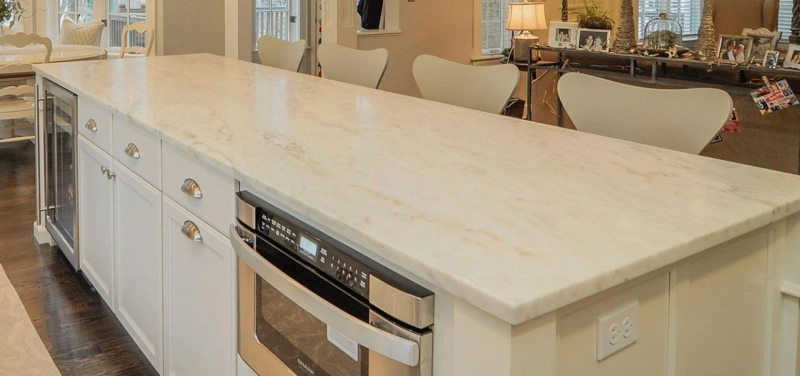Selecting the right kitchen countertop is a crucial decision in the design and functionality of your kitchen. It not only impacts the aesthetics but also the durability and maintenance of your cooking space. In this comprehensive guide, we will explore various types of kitchen countertops, their pros and cons, and tips to choose the best one for your needs.
Types of Kitchen Countertops
Granite Countertops
The granite countertops are a popular choice due to their natural beauty and durability. Each slab of granite is unique, providing a one-of-a-kind look for your kitchen.
Pros:
Highly durable and resistant to scratches and heat.Available in a wide range of colors and patterns.Adds significant value to your home.Cons:
Requires periodic sealing to prevent stains.Can be expensive compared to other materials.Heavy, necessitating strong cabinetry for support.Quartz Countertops
Quartz countertops, also known as engineered stone countertops, are made from natural quartz combined with resins and pigments. They offer a non-porous, low-maintenance option that mimics the look of natural stone.
Pros:
Extremely durable and resistant to stains and scratches.Low maintenance, no sealing required.Available in a wide range of colors and patterns.Cons:
Can be more expensive than natural stone options.Less heat resistant than granite.Marble Countertops
The marble countertops are synonymous with luxury and elegance. They are known for their beautiful, veined appearance and smooth texture.
Pros:
Unique and stunning appearance.Heat resistant.Excellent for baking due to its cool surface.Cons:
Prone to scratches, stains, and etching from acids.Requires regular sealing and maintenance.Can be costly.Laminate Countertops
Laminate countertops are a budget-friendly option made from layers of plastic bonded to particleboard or kraft paper.
Pros:
Affordable and available in a wide variety of colors and designs.Easy to install and replace.Low maintenance.Cons:
Not as durable as other materials; can scratch and chip easily.Susceptible to heat damage.Edges and seams can peel over time.Solid Surface Countertops
Solid surface countertops are made from acrylic or polyester resins combined with pigments. They provide a seamless and customizable option for your kitchen.
Pros:
Seamless installation with integrated sinks and backsplashes.Non-porous and easy to repair.Available in a wide range of colors and patterns.Cons:
Can be damaged by heat and sharp objects.Less natural appearance compared to stone.Can be expensive.Butcher Block Countertops
Butcher block countertops offer a warm, rustic look and are made from strips of wood glued together.
Pros:
Warm and inviting appearance.Can be sanded and refinished to remove scratches.Ideal for cutting and food preparation.Cons:
Requires regular sealing and maintenance to prevent water damage.Prone to scratches and dents.Can harbor bacteria if not properly maintained.Factors to Consider When Choosing a Kitchen Countertop
Durability
Consider the durability of the countertop material. If you cook frequently or have a busy household, you will need a surface that can withstand heavy use, heat, and potential spills.
Maintenance
Different materials require different levels of maintenance. For example, natural stone countertops like granite and marble need regular sealing, while quartz and solid surface countertops are low maintenance.
Budget
Your budget is a significant factor in choosing the right countertop. Materials like granite, quartz, and marble tend to be more expensive, while laminate and butcher block offer more affordable options.
Aesthetics
The appearance of the countertop can set the tone for your kitchen's design. Choose a material and color that complements your cabinetry, flooring, and overall kitchen style.
Installation
Some countertop materials are more challenging to install than others. Granite and quartz, for instance, require professional installation, whereas laminate and butcher block can be installed by experienced DIYers.
Sustainability
If environmental impact is a concern, consider the sustainability of the material. Recycled countertops, bamboo, and sustainably sourced wood are eco-friendly options.
Conclusion
Choosing the perfect kitchen countertop involves balancing your aesthetic preferences, budget, and practical needs. By understanding the characteristics, advantages, and drawbacks of each material, you can make an informed decision that enhances both the beauty and functionality of your kitchen. Whether you opt for the timeless elegance of marble, the durability of quartz, or the budget-friendly laminate, the right countertop can transform your kitchen into a space that is both beautiful and functional.
Visit: Write Up Cafe



